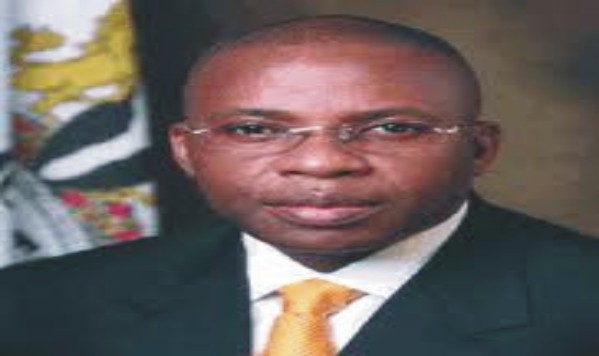By Prince Stanley Okoroji (08064378213)
Around 600BC, the Heraclitus, an Ionian pluralist cosmologist and philosopher lanced his philosophical thesis that, “all of reality was in perpetual flux,” nothing is permanent; everything is constantly changing to the extent that one can neither breath in the same air again or step into the same flowing water twice; unchanged. The perpetual flux is the raison d’etre of the common man’s consolatory speech, ‘no condition is permanent.” But for Heraclitus, the only permanency in existence is the very fluxity of reality. Only change is permanent and change itself is neither a condition nor reality (thing). Fluxity is perpetual in reality (and its entirety- creatures, natures and events) and is witnessed by man- The bearer, agent, subject (victim and benefactor) of change.
Informed by the Herclitean perpetual flux, all of nature is polarized into binary opposites: Up and down, old and new, before and after, man and woman, white and black, good and evil, subject and object, gaining and loosing, happiness and sadness, laughing and crying, etc. With this sitz in leben of realities (fluxity and binary opposites) in mind, it is good to look a little at the semiotic significances of the concept of returning, which analogical critical disposition Imo State may be into.
The word return has various nuances that primarily entail mobility and the absence of (physiological and psychological) inertia. And both as a noun and (or) a verb, the term return has four existential significances. First, return means coming back. In this sense, it means arriving or coming back to the place where one previously was, entailing a prior departure. Second, returning means sending back. Whether the sending back is used in the active sense or the passive sense, the sent has the most significant existential permanence and enjoys the greater psychological significance of having made it. The sender existentially bears a superiority state and enjoys an authoritative decision-making and evaluation significance. Third, returning signifies having sentient or material form. Here, returning has two senses: Regeneration of a former state and or the repossession of a previous state. Fourth, returning means resumption or going back to a previous activity or situation one has been used to. In this sense, return means going back to take up (once more) an abandoned or paused state, activity, situation or manner of subsistence after a period of inactivity caused by absence and time-lag, which all culminates in a hiatus.
These four significances of returning make me reflect on the Douglas House months back and months ahead. After all, Aristotle, the Great Greek philosopher once defined time as the measurement of events with relation to before and after– The Douglas House Heri, Hodie et Semper (Yester, Today and Always- Tomorrow), which is unknown, pregnant (of binary opposites and fluxity) and purely indeterminate. The occupation of the Douglas House yesterday and tomorrow is a food for thought on the perpetual flux of the reality of human situation in relation to time and in being in leadership position as an impermanent status. It is replete with flux, entrance and exit, exit and entrance; as witnessed in Edo, Rivers, Anambra States, etc., (and recently in Niger State and others too, and certainly in Imo God willing and soonest) by dint of the freaks and long claws of fate.
The present Governor of Imo State has passed through several litigations and Court injunctions though never comparable to what Chief Ikedi Ohakim passed through when occupying the Douglas House. What have been the outcomes of these varied tribunal judgements? Certainly in favour of Governor Okorocha, they have all been. But is he free from other litigations? Are there still some gubernatorial cases against him in court? Certainly, there are and those that are rarely escapable. With this rarity of elusion and obvious inescapability of impeding judgements, can Okorocha be lucky again? Perhaps, with these tilts of favour towards Ohakim, certainly, Heraclitus may be immortalized. Change will be as it has been; going will be coming for Ohakim and coming will be going for Okorocha. In either of the mobility cases, the projector of the movements (exit and entrance) enjoys the superiority status of elevator of truth and the authoritative decision-maker who stands in loco dei, and is the Lord of truth, whose independence (of the Judiciary) should be maintained nationwide.
Certainly, elections in Nigeria are fast evolving: From the qualified to godfatherism, from godfatherism to electoral malpractices, from the latter to the supremacy of the tribunal and the electorates’ choice. While the electorate has at last regained their lost status, at least in Imo State, the Judiciary is fat becoming reliable though the interference of the Executive Arm of Government makes the reality of the independence of the Judiciary doubtful. Evidently, Tribunals for elections treat facts and their substantiations and not emotions and sympathy as its leaders assume God’s Lordship and are accountable to the Eternal Eye and Truth whose status they assume and assist in.
None knows or can predict the final verdict. “To be or not to be”, Shakespeare’s Hamlet said, was “the question”. If Ohakim wins, that is change but will he be going to Douglas House or returning to it? Certainly, it will be a returning to since he has been there before. Certainly, it will be a returning since a higher authority is the projecting sender. Certainly, it will be returning, a repossession of a previous state and mandate. Certainly, it will be a returning; a resumption of a paused state, situation and activity previously marred by dint of strangled truth and concealed justice. Returning and coming back enjoy same significances save that the sending back significance entails the superiority of the projecting sender and the sent’s socio-psychological contentment on recuperating a lost state. The joy of coming back home is the existential gratitude innate in returning. Christ, the Great Master portrayed this inestimable joy in the Lukean Return of the Prodigal Son– the contrition, the filial repossession, the feast and joys of being reunited, and of regaining one’s status.
Change is no crime but the state of being that is orchestrated by exerting forces, events, circumstances and non-perseverance of truth and falsity. Truth is like a banana peel, eaten and thrown into the water by the Nembe people, no matter the drowning and concealing strength of the projectile speed, it must surface for the owner of the lost bunch to find it. Returning also is going back but a non-progressive language. Certainly, “I was”, belongs to the realm-claims of experience, to Curriculum Vitae but never a progressive possession, state or continuity.











